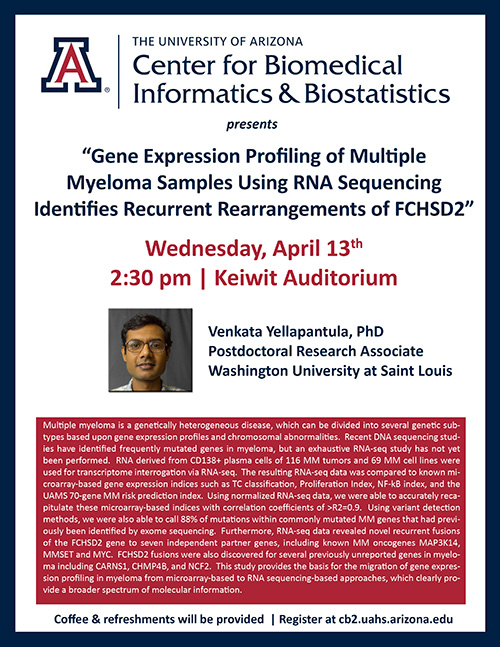 Gene Expression Profiling of Multiple Myeloma Samples Using RNA Sequencing Identifies Recurrent Rearrangements of FCHSD2
Gene Expression Profiling of Multiple Myeloma Samples Using RNA Sequencing Identifies Recurrent Rearrangements of FCHSD2
Venkata Yellapantula, PhD
Postdoctoral Research Associate
Washington University at Saint Louis
Wednesday, April 13th
2:30 pm | Keiwit Auditorium
___________________________________________________________________________
Multiple myeloma is a genetically heterogeneous disease, which can be divided into several genetic subtypes based upon gene expression profiles and chromosomal abnormalities. Recent DNA sequencing studies have identified frequently mutated genes in myeloma, but an exhaustive RNA-seq study has not yet been performed. RNA derived from CD138+ plasma cells of 116 MM tumors and 69 MM cell lines were used for transcriptome interrogation via RNA-seq. The resulting RNA-seq data was compared to known microarray-based gene expression indices such as TC classification, Proliferation Index, NF-kB index, and the UAMS 70-gene MM risk prediction index. Using normalized RNA-seq data, we were able to accurately recapitulate these microarray-based indices with correlation coefficients of >R2=0.9. Using variant detection methods, we were also able to call 88% of mutations within commonly mutated MM genes that had previously been identified by exome sequencing. Furthermore, RNA-seq data revealed novel recurrent fusions of the FCHSD2 gene to seven independent partner genes, including known MM oncogenes MAP3K14, MMSET and MYC. FCHSD2 fusions were also discovered for several previously unreported genes in myeloma including CARNS1, CHMP4B, and NCF2. This study provides the basis for the migration of gene expression profiling in myeloma from microarray-based to RNA sequencing-based approaches, which clearly provide a broader spectrum of molecular information.


